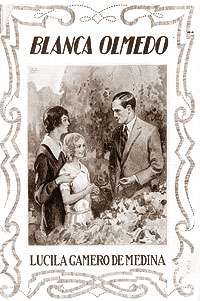Blanca Olmedo
Blanca Olmedo is perhaps the best known novel of the noted Honduran novelist Lucila Gamero. A romance novel, published at a time when the trend for romantic literature had fallen out of fashion in Central America, it was completed in 1903 and published in 1908.[1] It is considered to be one of the most important novels in Honduran literature in the early twentieth century. It is unusual given that it was written by a female writer who was critical of the corrupt establishment in Honduras.[2]
 | |
| Author | Lucila Gamero |
|---|---|
| Country | Honduras |
| Language | Spanish |
| Genre | Romantic novel |
Publication date | 1908 |
| Media type | |
Plot summary
In this love story, Blanca Olmedo, a young woman of a good family, has lost all her property thanks to the evil actions of a corrupt lawyer (Elodie Purslane/Elodio Verdolaga).[2] This circumstance requires her to work as a governess in the house of the Moreno family, which is where she meets the love of her life, Gustavo Moreno. Three people are opposed to their love, including the evil lawyer who punishes her further from seeing Gustavo. A further barrier is created when Gustavo goes away to fight in the war. Blanca, meanwhile falls ill with being separated from Gustavo and dies dreaming of Gustavo.[1] When he returns to find her dead, and learns of the evil conspiracy against their relationship. He commits suicide, without either of them consummating their love.[2] Then in guilt of what they have done, one of the conspirators Doña Micaela established an orphan asylum after his death for victims of those who feel sadness and desperation and have lost the will to live.
Meaning and legacy
Lucila Gamero in this story has covered a number of subjects in this sentimental romance drama; the inevitable fate of the lovers, the idealization of women and subjectivisation of nature, and the rebellious romantic who opposes the established order but does not overcome it.
Despite the fact that in Blanca Olmedo, Lucila Gamero puts all the resources on the scene of the novel as romantic and sentimental, nature does not have much presence, not as a stage nor as a determinant of the nature of the characters.[1] Its action takes place on a farm near a Honduran city at the end of the 19th century, where all sorts of prejudices existed. Therefore, this novel, apart from being written by a woman which was something unusual in the country at the time, it is important because in it the author assumes a critical position against social and moral values of the time, and especially the Church and corruption.[2] In the novel Olmedo refuses to attend church and describes herself as "free and young".[1] In the novel the character has serious questions about the way in which the church is operated asking questions like, "What if these practices are not consistent with my beliefs?" (p. 55) and refuses to confess, " My confessor? ... Neither he, nor anyone else, God is my confessor." (p. 23).[1] However the book is neither anti-Christianity nor atheist, it is more an illustration of the profound weaknesses in certain representatives of the clergy and susceptibility towards manipulating people.[1] The protagonist of the novel is reluctant to accept their spiritual advice and the character of Doña Micaela is also in some ways a victim of such manipulation under the spiritual guidance of Father Sandino. The immoral and perverse conduct of priests such as Father Sandino in the novel and his platonic infatuation with a virgin, mocks his vows of chastity and reiterates this clerical criticism.[1] His behavior is the complete opposite from what is expected from a servant of God. These criticisms illustrated in the novel were unprecedented in that Honduran intellectuals, until then, had not taken liberal criticisms of the religious and political establishment.[1] Despite the romantic formulas used by the author at a time when romanticism was already surpassed in Latin America, the novel is well structured, and is considered the greatest novel of Honduras in the early twentieth century.[1]
Some critics have drawn comparisons of the life of the author Lucila Gamero with the character of Blanca Olmedo in the novel, identifying an autobiographical element in that she is intellectual, religious, philosophical and even political.[1] Both exhibited an element of pantheism and believed that nature is in intimate relationship with God and cannot co-exist without each other (p. 41).[1] Critics have noted that they were both visionary and "freethinkers" at a time in history when Honduran and Central American women regardless of ethnicity and social class occupied a subordinate role with regard to men until at least the 1920s.[1] Adding to the effect of the novel and the role of women in Honduras, in 1897, the president at the time Policarpo Bonilla, had said in a speech that he did not believe that women should study science, law, medicine, engineering, mathematics or physics, adding that as a woman they "do not govern a nation" and therefore should not to go into politics, diplomacy, economics, and statistics.[3] The character of Blanca Olmedo, with her strong views as a woman and advanced intellectual abilities, are therefore a direct political opposition to Bonilla's ideals.
References
- "Blanca Olmedo: Cien años, de muchas lecturas" (in Spanish). La Tribuna. June 1, 2008. Archived from the original on July 20, 2011. Retrieved April 13, 2009.
- Funes, José Antonio. "Libros clave de la narrativa hondureña (I):Blanca Olmedo" (in Spanish). Instituto Cervantes. Retrieved April 13, 2009.
- "Blanca Olmedo y la pluma de Lucila Gamero" (in Spanish). La Tribuna. June 15, 2008. Archived from the original on July 20, 2011. Retrieved April 13, 2009.